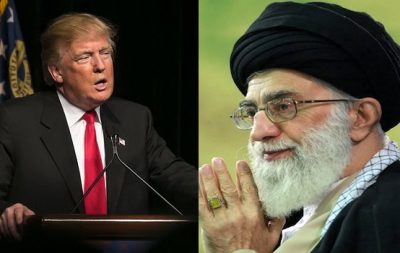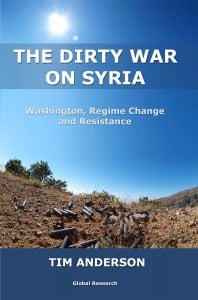Trump’s Desperate Measures Against Iran Could Lead to US Isolation: Prof. Tim Anderson

Note to readers: please click the share buttons above
A senior professor and political analyst based in Australia described the recent formation of an Iran Action Group (IAG) in the US as one of the Donald Trump administration’s desperate moves against Tehran, which will only isolate Washington.
“The new measures against Iran by the Trump administration, including the formation of an Iran Action Group, are measures of desperation,” Professor Tim Anderson, a lecturer at the University of Sydney, said in an interview with the Tasnim News Agency.
“Washington has no real allies in this, just some countries which are afraid to contradict Washington,” he added.
The main effect of these desperate measures “will be to isolate the USA” in the long term, the analyst said.
Professor Tim Anderson is a distinguished author and senior lecturer of political economy at the University of Sydney, Australia. Author of the ‘The Dirty War on Syria’, he has been largely published on various issues particularly the Syrian crisis.
The following is the full text of the interview.
Tasnim: As you know, the US government’s hostility toward Iran has recently entered a new stage. Secretary of State Mike Pompeo has formed a dedicated group to coordinate and run the country’s policy towards Iran following President Donald Trump’s unilateral withdrawal from the 2015 nuclear deal with Tehran. Pompeo announced the creation of the Iran Action Group (IAG) at a news conference, naming Brian Hook, the Department of State’s director of policy planning, as its head. What do you think about the group and its objectives and do you think that it would be able to reach its goals?
Anderson: The new measures against Iran by the Trump administration, including the formation of an Iran Action Group, are measures of desperation. Washington has no real allies in this, just some countries which are afraid to contradict Washington. Other countries, which formerly backed the nuclear disarmament moves against Iran (notably Russia and China, but also some European countries) have abandoned the US, leaving it isolated. And that isolation is deepening because Washington is now threatening all its so-called allies.
All this might seem quite irrational, but we should remember that, for the US, the stakes are high. The destruction of Syria was meant to pave the way for the isolation of and siege on Iran. That was the goal of the ‘New Middle East’ (by the Bush 2 and Obama regimes), which was supposed to usher a world of ‘freedom and democracy’, under North American tutelage.
Yet after several bloody wars the US proxy armies led by Jabhat al Nusra and DAESH, financed and armed by US agents in the region, were defeated by resistance forces in Lebanon, Syria, and Iraq. Syria and its allies prevailed. So while the US and its proxies remain dangerous, and they continue to kill and destabilize, strategically they have failed, and they know it.
Compounding the US obsession with Iran is the fact that, as the ‘New Middle East’ project was failing, an even greater counter project for Eurasia integration was building, and here also Iran is important. Tehran now has mega linkage projects with Russia and China, and developing links across central Asia. Pepe Escobar’s recent article ‘Economic war on Iran is war on Eurasia integration’ outlines this quite well.
China’s new network of infrastructure projects (the Belt and Road Initiative) move forward inexorably, as Russia’s economic links with East Asia, West Asia and parts of Europe steadily grow, avoiding US interference. If Asia and Europe succeed in building strong economic links, the role and influence of North America across the entire Eurasian super-continent will be reduced.
In short, Washington sees Iran as the major obstacle to its plan to dominate West Asia, and also an important part of the Chinese and Russian led Eurasian integration, which they oppose. That is why, in my view, we see these desperate measures, with President Trump threatening most of his ‘allies’ over Iran. The main effect, in the longer run, will be to isolate the USA.
Tasnim: The Trump administration recently threatened to cut Iranian oil exports to zero, saying that countries must stop buying its oil from Nov. 4 or face financial consequences. Washington later softened its threat, saying that it would allow reduced oil flows of Iranian oil, in certain cases. Since oil is a strategic product and countries around the world always demand it, do you think that the US is able to carry out this threat at all?
Anderson: The US has been threatening many countries not to buy Iran’s oil. This has some influence on some countries. India, for example, seems to be hedging its bets. The French company Total has pulled out of its investments, no doubt judging that its business in the USA is worth more to it than those in Iran. However, oil is a global commodity and there are limits on how much economic loss companies and states will tolerate in seeking ‘safer’ but more expensive alternatives. And of course, the sanctions on Iran hardly deter the other countries which face their own unilateral sanctions from Washington.
For those which chose to maintain at least normal business links with Iran, there are some unintended consequences which are unfavorable to the US. China, for example, which has no problems in purchasing Iran’s oil, seems to have created a boom in Iranian shipping, through its deal to import Iranian oil in Iran’s ships, with Iran covering the insurance side (See this). The ‘petrodollar’ is also being undermined. China, which has been trading in bilateral swaps with many countries over the last decade, is quite happy to pay for its oil in Yuan.
US sanctions do bring pressure to bear on vulnerable countries, not least Iraq, still struggling to escape a virtual colonization by the US, after the brutal 2003 invasion. Iran-Iraq trade is substantial and of strategic importance, for both neighboring countries. In the short term, the US can pressure Iraq over its use of US dollars. However, as US analysts have recognized, these pressures are ‘backfiring’. Given the popular mood and economic realities, even the most compliant Iraqi leaders ‘cannot afford’ to cut economic ties with Iran. If Iraq ‘violates sanctions and is hit by US penalties, it is likely to place the country further into Iran’s sphere of influence’ (See this).
US unilateral sanctions on Russia also add to pressures on other US allies to move out of the North American financial sphere. Germany’s foreign minister Heiko Mass recently called for an alternative to the SWIFT system for international transactions (See this), not least so as German industry can purchase cheaper Russian gas. Now the Europeans have been slow in this regard, but at least they are talking openly about seeking greater independence from their NATO ‘big brother’.
In short, US sanctions will cut some markets and force some adjustments. However, the demand for Iran’s oil is not going away. Unlike a decade ago, the US has few allies in this campaign. Fairly rapidly this economic aggression will consolidate relations amongst Iran’s more reliable strategic partners, weaken the petrodollar and pressure a range of more independent policies amongst US allies.
Tasnim: Trump’s threat is part of his walking away from the Iran nuclear deal, known as the Joint Comprehensive Plan of Action (JCPOA). He also plans to fully reinstate anti-Tehran sanctions from November 4. In the meantime, the EU has vowed to counter Trump’s renewed sanctions on Iran, including by means of a new law to shield European companies from punitive measures. German Foreign Minister Heiko Maas recently said Europe should set up payment systems independent of the US if it wants to save the JCPOA. What do you think about the EU’s role in reducing Washington’s pressures against Tehran and saving the deal?
Anderson: Washington’s cynical rejection of the JCPOA / Barjam has undermined its support across the board. The Europeans clearly took the nuclear agreement more seriously than Washington. While European companies are now under serious pressure to abandon their Iranian investments, so as to maintain their US investments, the European Union has begun to ‘grow a spine’ in face of Trump’s bullying.
Alongside the German proposal for bypassing the US controlled SWIFT system, the EU has re-activated its ‘block law’, to protect companies doing business in Iran (See this). This law was first created to avoid the third-party impact of unilateral US sanctions on Cuba. The statute protects ‘against the effects of the extra-territorial application of legislation adopted by a third country’. It prohibits compliance with non-recognized US sanctions while rejecting any court rulings to apply US penalties.
There is genuine resentment in Europe at US unilateralism and at Trump’s bullying, but the EU has been deeply embedded in US strategy for some time and its incipient moves must be read in that light. There are some rumblings of European economic independence, as regards US aggression against both Russia and Iran; but greater dynamism for structural change is coming from the east, through the Eurasian initiatives of China and Russia.
Will the JCPOA/Barjam survive? I suspect not. The US has openly betrayed the deal and split with all other players. Most of the Europeans seem to want to maintain the deal, but if they cannot deliver on their side, to remove sanctions against Iran, there is nothing in it for Tehran. Russia and China are long gone. US analysts recognize that Washington has no credibility to renegotiate anything and nothing to offer; so there will be no second JCPOA (See this). Both Iran’s Leader Ayatollah Khamenei and the country’s Foreign Minister Javad Zarif are now calling the 2015 agreement a ‘mistake’. That seems to bridge the gap between Iran’s liberals and ‘principlists’ over the matter: greater Iranian unity in face of an imperial project with seriously eroded support. Why would Iran allow foreign surveillance of its energy and nuclear sector, and get nothing in return? Time to move on, it seems.
The Dirty War on Syria
Author: Tim Anderson
ISBN Number: 978-0-9737147-8-4
Year: 2016
Pages: 240
List Price: $23.95
Special Price: $15.00
click to purchase, directly from Global Research Publishers


